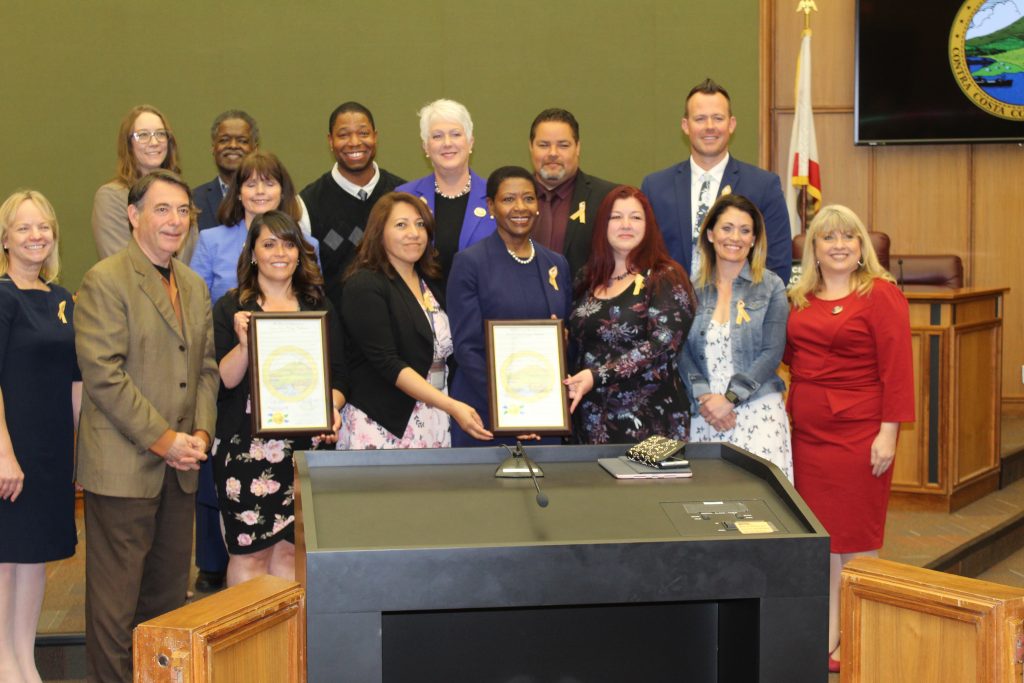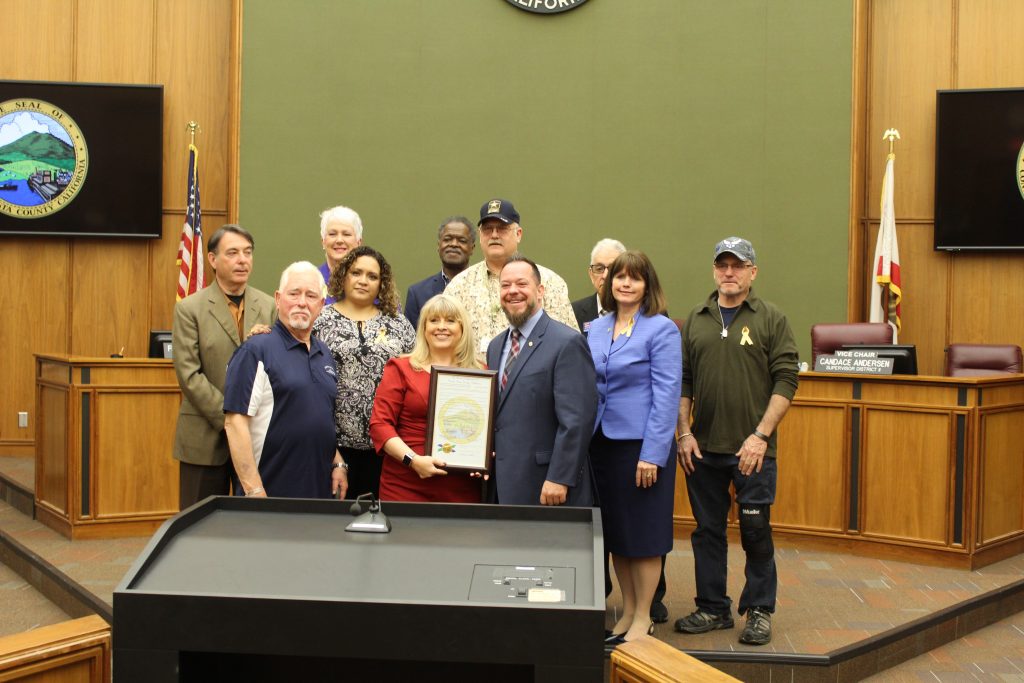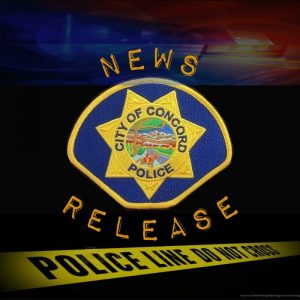 Identified by caller as their father, stabbed family members with knife
Identified by caller as their father, stabbed family members with knife
On April 11, 2019 at approximately 2:34 AM, Richmond officers were dispatched to 930 Wilson Ave., on a report of a home invasion. The caller reported that suspect was their dad who had broken a window and entered the residence. The suspect was armed with a knife and trying to stab the family. The caller reported that the family was trapped inside the residence and was unable to exit.
Richmond officers arrived on scene and the shooting occurred after officers confronted the armed suspect at the rear patio door. Officers interrupted the suspect’s physical assault on a family member, then fired when the armed suspect ignored commands and advanced on them. The suspect was later pronounced deceased on scene.
Officers rescued an adult female suffering from a laceration to her stomach and a male juvenile suffering from a laceration to his face. No other family members were harmed during the incident. The family was taken to a local hospital where they are currently being treated for non-life threating injuries.
The Contra Costa County District Attorney’s Office as well as the Richmond Police Department are actively working this on-going investigation, according to the Contra Costa County Fatal Incident protocol. There was an active Domestic Violence restraining order against the decedent, who has prior DV contacts.
Read MoreWest county will be opening its first warming center which will provide a space for unsheltered residents to have a warm space at night. The center will Be located at GRIP – Greater Richmond Interfaith Program.
While it isn’t a permanent solution to the great work that needs to be done to alleviate homelessness, it helps. If you know someone who needs help call 211.
Richmond has also started the Richmond-San Pablo CORE homeless outreach team to provide on the ground services to the unsheltered, including helping people get access to the warming center.
Read More Found with billy club, dagger, lock picks
Found with billy club, dagger, lock picks
By San Ramon Police Department
While you were sleeping….your San Ramon Police Officers were keeping you and your property safe.
Last night, Friday, April 12, 2019, an Officer stopped a car that had paper license plates covering the actual California DMV license plates. The driver (28-year-old Manteca resident, Troy Payton – no relation to the Herald publisher) was arrested for an outstanding warrant held by San Joaquin County.
The officer also found a billy club, a dagger, lock picks, and a modified screwdriver under the driver’s seat of the car, which led to add to additional charges. Just another excellent example of the work your San Ramon Police Department Officers do every night to keep the San Ramon Community safe.
Read MoreOn April 11th, 2019 at 2:47 P.M., Concord Police officers responded to a reported stabbing of a fifteen-year-old juvenile subject on Salvio Street. Investigation revealed that the victim had been approached by three adult males, one of whom asked to use the victim’s cell phone. After the victim gave his phone to this adult, all three walked away, having not returned the phone to the victim. The victim followed the three adults to a nearby parking garage, begging for his phone to be returned. As the adults entered a stairwell in the parking garage with the victim still following, the adults battered and stabbed the victim, causing significant injuries that were later determined not to be life threatening. The adults also stole the victim’s shoes and personal belongings before fleeing the area. The victim contacted the Concord Police Department and was transported to a nearby hospital.
Within a few hours, all three suspects were located by CPD officers and positively identified by the victim. Most of the victim’s personal property was recovered. Each suspect was charged with kidnapping, robbery, conspiracy to commit robbery, assault with a deadly weapon, and enhancements for participating in a street gang. All three suspects remain in county jail on nearly $300,000.00 bail.
As this investigation is ongoing, no additional information is being released at this time. CPD case #19-4869
Read More Apparent suicide
Apparent suicide
By Jimmy Lee, Director of Public Affairs, Contra Costa County Office of the Sheriff
This morning (April 13, 2019) at about 3:31 A.M., Contra Costa County Deputy Sheriffs responded to the women’s holding area in Intake and found that a female inmate had apparently hanged herself inside the bathroom.
Medical staff at the jail responded immediately and began life saving measures. The fire department and an ambulance also responded.
The inmate was later pronounced deceased at the scene. The release of her identity is pending notification of next of kin.
The investigation into this death is ongoing. Per the in custody fatal incident protocol, the investigation is being conducted by the Contra Costa County District Attorney’s Office and the Office of the Sheriff.
Read MoreWednesday night, April 10, 2019 at about 9:01 pm, Contra Costa CHP was advised of a solo vehicle collision with a pedestrian on HWY-4 eastbound, just west of Loveridge Road in Pittsburg. Upon emergency personnel and CHP arrival, it was determined an adult male pedestrian (unknown identity and age) was struck by a vehicle within the #4 lane of the roadway and pronounced deceased. The Contra Costa County Sheriff’s Coroner’s Office will be handling the release of identity of the deceased male once he has been officially identified.
A solo male driver of a White Nissan sedan was traveling eastbound on HWY-4 and approaching Loveridge Road, when the pedestrian, that was reported walking in the center divide ran across the roadway and directly in the Nissan’s path. The driver of the Nissan was unable to avoid the pedestrian in the roadway and struck him. Unfortunately, the pedestrian did not survive and was pronounced deceased on scene. The driver of the Nissan remained on scene and was cooperative throughout the investigation.
It is unclear if drugs or alcohol are a factor in this collision as it pertains to the pedestrian and is still under investigation. If anyone witnessed this collision or the events leading up to it, please contact Contra Costa CHP in Martinez, (925) 646-4980.
Read MoreCongressman Mark DeSaulnier (CA-11) will host a pair of town halls to engage in a “Conversation on Race” on Tuesday, April 23rd and Saturday, April 27th. These town halls are the latest in a series of discussions on race hosted by Congressman DeSaulnier and are intended to facilitate more understanding, healing, and progress to help us move forward as a nation.
“A Conversation on Race” Town Halls
Tuesday, April 23rd
Special Guest: Congresswoman Karen Bass (CA-37), Chair of the Congressional Black Caucus and first African American woman Speaker of the California Assembly
6:30 p.m. to 8:00 p.m.
Diablo Valley College Cafeteria
321 Golf Club Road, Pleasant Hill, CA 94523
RSVP: https://desaulnier.house.gov/town-hall-rsvp
Saturday, April 27th
Hosted With: Congresswoman Barbara Lee (CA-13)
12:00 p.m. to 1:30 p.m.
Black Repertory Group Theater
3201 Adeline Street, Berkeley, CA 94703
RSVP: https://desaulnier.house.gov/town-hall-rsvp
These events are open to the public, press, and photographers.
Please RSVP at https://desaulnier.house.gov/town-hall-rsvp or by calling 925-933-2660. To request ADA accommodations or for more information, please contact Congressman DeSaulnier’s Walnut Creek or Richmond office.
Congressman DeSaulnier launched his first town hall of this series on February 3, 2018 and information on it can be found here.
Read MoreBy Jimmy Lee, Director of Public Affairs, Contra Costa County Office of the Sheriff
At approximately 9:50am, the Contra Costa County Office of the Sheriff responded to a report of an armed robbery at a bank on the 14800 block of State Route 4 in Discovery Bay.
A witness at the location reported she saw two men run into the bank and run out shortly after, carrying what was thought to be a handgun and a backpack.
Deputy Sheriffs arrived at the location and confirmed that an armed robbery had occurred. The two suspects fled with an undisclosed amount of cash.
They were last seen running to a vehicle and leaving the area north on Bixler Road. The suspects are outstanding.
The investigation is ongoing.
Anyone with any information on this case is asked to contact the Office of the Sheriff at (925) 646-2441 or (925) 313-2600. For any tips, email: tips@so.cccounty.us or call (866) 846-3592 to leave an anonymous voice message.
Read More
The Contra Costa County Board of Supervisors presented a resolution to District Attorney Diana Becton (center) and nine persons for their work in defending crime victims’ issues and their rights at Tuesday’s supervisors meeting. The event marks the District Attorney Office’s commemoration of National Crime Victims’ Rights Week, April 7-13. This year’s awardees are Juliann Marlang for Special Courage, Sarah Alpert for Making a Difference, United Parcel Service driver Jesse Gregory for Above and Beyond, Sandra Guiterrez-Banales for Victim Advocate, Laura Muro for Support Staff, Senior Inspector Rick Rivera for DA Investigators, Deputy District Attorney Alison Chandler for Attorney, Detective Joseph Nunemaker for Law Enforcement and Nancy Kenoyer for Probation Officer. Vigils were held on Thursday, at the Family Justice Center, in Concord and Pittsburg City Hall. On Saturday, April 13 at 5:30 p.m. the Survivors Speak National Healing Vigil will be held at the Sojourner Truth Church, 2621 Shane Drive, Richmond. This year’s theme – Honoring Our Past, Creating Hope for the Future – encourages commemoration, honor, and respect toward the crime victim advocates, allied professionals, and selfless volunteers who have worked for increased rights for crime victims. Photo by Daniel Borsuk.
Mitchoff gets heat over Pleasant Hill Library closure during construction of new library
By Daniel Borsuk
At their meeting on Tuesday, Contra Costa County Supervisors approved on a 4-1 vote the ordinance that ties their base salaries to 60 percent of the salaries of superior court judges. Supervisor Candace Andersen cast the dissenting vote. The pay raise goes into effect for the period between July 2, 2019 and Dec. 31, 2019; then increases to 63 percent of judges’ salaries for 2020 and finally to 65 percent of judges’ salaries thereafter.
Supervisors will receive the same periodic increases as are as granted by the legislature to the judges as recommended by the Ad Hoc Citizen’s Committee.
Supervisors waived the reading of the ordinance and fixed their April 16 meeting for adoption of the ordinance. Two weeks ago, supervisors had voted 3-1 with Andersen opposing and Supervisor Diane Burgis absent due to recuperation from heart surgery.
In casting a negative vote again this week, Andersen said, “I still have my reservations. We still earn Bay Area salary, but this isn’t a full-time job. It’s more than a full-time job. I can leave my house at 8 a.m. and not return until 10 p.m.”
Consider Exempting Transportation Impact Fees for Accessory Dwelling Units
Supervisors can be expected to adopt a policy aimed at exempting the imposition of public transit fees on homeowners wanting to build accessory dwelling units to homes as a jab of slowing down the Bay Area’s runaway rising housing costs.
Supervisors on Tuesday instructed county Conservation & Development Department (CDD) officials to draft a policy that would halt the levying of transit impact fees on ADU applications in unincorporated Contra Costa County, a move that could lift a financial burden off the shoulders of homeowners wanting to add living units onto their homes. ADU transit impact fees are imposed taxes for public transit improvement or road construction to mitigate increased public transit patronage and automobile trips stemming from ADU construction.
Based on county data, since 2017, there’ve been 130 ADU’s approved, 42 interior conversions and 88 new footprint additions approved. County records also show 130 ADU permits were issued via administrative means such as variance or deviation from the standards. Total ADU tax revenues data collected during that two-year period was unavailable.
“Ultimately, however, the reduction and or elimination of traffic impact fees would unavoidably create a funding gap.” warned CDD Director John Kopchik in a memo to supervisors. “That gap cannot be filled using the fee program’s revenue and must be backfilled with other sources.”
So far there has been political posturing locally and out of Sacramento concerning the status of ADU transit fees, but housing affordability advocates have maintained ADU transit fee are part of the reason for the Bay Area’s housing unaffordability crisis.
Leading the charge on the ADU fee exemption conversation at the county level has been board chair John Gioia of Richmond who has been tuned into the ADU and tax exemption discussions at West Contra Costa Transportation Advisory Committee level.
Gioia said by exempting the transit fees it would remove financial barrier on homeowners wanting to add onto their homes. In West County, the additional costs a homeowner pays on average per ADU is $10,000 the supervisor said.
Supervisor Candace Andersen of Danville praised the ADU transit fee exemption fee proposal saying” It’s a great way for families to stay together.”
CDD staff is expected to present a draft ordinance on the ADU tax exemption proposal sometime either in June or July.
Mitchoff Gets Heat Over Library Closure
The upcoming closure of the Pleasant Hill Public Library drew protests from upset community residents, some of whom accused Supervisor Karen Mitchoff of Pleasant Hill of playing into the hands of real estate interests by closing down the library too soon.
Besides the construction of a new library, the county in conjunction with the city of Pleasant Hill are making way for the construction of a housing development on county owned property long vacant nearby the library.
The outdated library will be demolished in late spring or early summer to clear the site for a new library that will eventually feature a café, a used book store and shelf space for 70,000 books. The new library will be completed in 2021 and according to Pleasant Hill residents like Dick Offerman that won’t help middle school students who rely on the library to study.
Mitchoff took issue with Offerman’s statement that the library’s closure would negatively impact middle school students.
“I’ve visited the library when middle school students are there and many of them are playing video games rather than studying,” she said.
Pat Morgan also of Pleasant Hill criticized supervisor Mitchoff for not doing enough in keeping the old library open.
“It’s unacceptable. This demonstrates real estate money interest. Greed. It’s shameful, “she said.

The Contra Costa County Board of Supervisors presented a resolution recognizing the services of the Delta Veterans Group, a nonprofit organization founded by veteran J.R. Wilson. Supervisor Diane Burgis of Brentwood presented the resolution to Wilson at Tuesday’s supervisors’ meeting in Martinez. Since 2012, the Delta Veterans Group has sponsored its annual Stand Down event at the Contra Costa Event Park (fairgrounds) in Antioch. At the event veterans can receive full medical treatments, court and legal services, DMV, chaplain services, housing, addiction and mental health counseling, employment and many other community services. Veterans are also provided clothing, meals, sleeping tents, and a safe place to stand down. The next Stand Down event will be held in September at the Contra Costa Event Park. Photo by Daniel Borsuk
Consent Items Approved
Supervisors approved the Sheriff-Coroner’s request to purchase Automated License Plate Reader cameras in the Discovery Bay area for an amount not to exceed $283,000. The ALPR camera capabilities are not only for the detection of stolen vehicles, but also as an investigative tool for persons and property crimes.
They also approved and authorized the Sheriff-Coroner to execute a contract with the State of California, 23rd District Agricultural Association (Contra Costa County Fair Board), including all indemnification of the State of California, to pay the county an amount not to exceed $35,000 to provide law enforcement services at the County Fair for the period of May 15-19, 2019.
Approve the collection loss write-offs in the public housing program in the amount of $106,729.09 for the quarter ending March 31, 2019, which is up nearly double from the $50,381.06 in collection losses for the same quarter in 2018. The Bayo Vista housing development in Rodeo led with the most loss write-offs with $73,470.36 followed by the Vista del Camino housing development in San Pablo with $10,501.
Supervisors also approved new Housing Choice Voucher payment standards for the Housing Authority that goes into effect April 15. Studio to three-bedroom sized unit payments standards have been reduced between $19 to $101 while the four to seven-bedroom sized payment standards are being increased between $121 and $175.
Read More The Contra Costa County District Attorney’s Office, in commemoration of National Crime Victims’ Rights Week (NCVRW), April 7-13, 2019, is raising awareness about crime victims’ issues and rights and introducing the community to the important resources and services available. On Tuesday the Contra Costa County Board of Supervisors presented a proclamation in recognition of National Crime Victims’ Rights Week. The DA’s Office then hosted a recognition ceremony to honor the awardees of National Crime Victims’ Rights Week.
The Contra Costa County District Attorney’s Office, in commemoration of National Crime Victims’ Rights Week (NCVRW), April 7-13, 2019, is raising awareness about crime victims’ issues and rights and introducing the community to the important resources and services available. On Tuesday the Contra Costa County Board of Supervisors presented a proclamation in recognition of National Crime Victims’ Rights Week. The DA’s Office then hosted a recognition ceremony to honor the awardees of National Crime Victims’ Rights Week.
The awardees for this year’s recognition are as follows:
- Special Courage: Juliann Marlang
- Making a Difference: Sarah Alpert
- Above and Beyond: Jesse Gregory
- Victim Advocate: Sandra Guiterrez-Banales
- Support Staff: Laura Muro
- DA Investigations: Senior Inspector Rick Rivera
- Attorney: Deputy District Attorney Alison Chandler
- Law Enforcement: Detective Joseph Nunemaker
- Probation Officer: Nancy Kenoyer
During the week, the District Attorney’s Office is honoring champions in advocating for expanded support and services to communities affected by crime.
- Thursday, April 11, 6:30 p.m. vigils in two locations: 2151 Salvio Street, Concord (Family Justice Center) and 65 Civic Ave, Pittsburg (Pittsburg City Hall)
- Saturday, April 13, 5:30 p.m. Survivors Speak National Healing Vigil, 2621 Shane Drive, Richmond (Sojourner Truth Church)
This year’s theme – Honoring Our Past. Creating Hope for the Future. – encourages commemoration, honor, and respect toward the crime victim advocates, allied professionals, and selfless volunteers who have courageously worked for increased rights for crime victims. The theme also invites us to look toward a future of inclusive, accessible, and innovative resources and services for survivors.
For additional information about this year’s National Crime Victims’ Rights Week and how to assist victims in your community, please contact our office at 925-957-8650 or visit www.contracostada.org.
For additional ideas on how to support victims of crime, visit OVC’s website at www.ovc.gov.
Read More
















